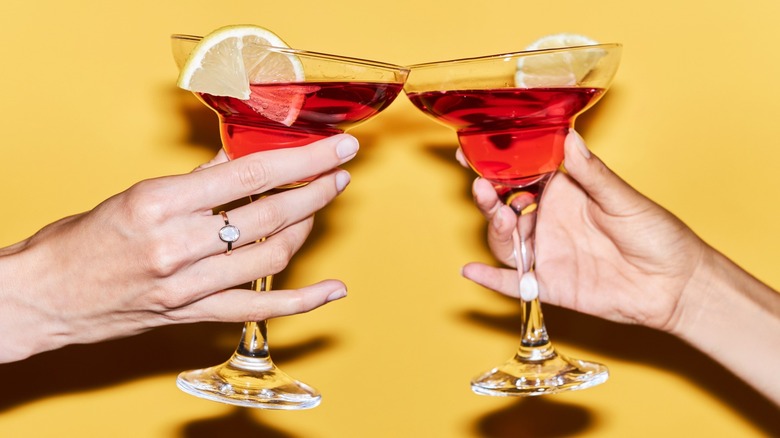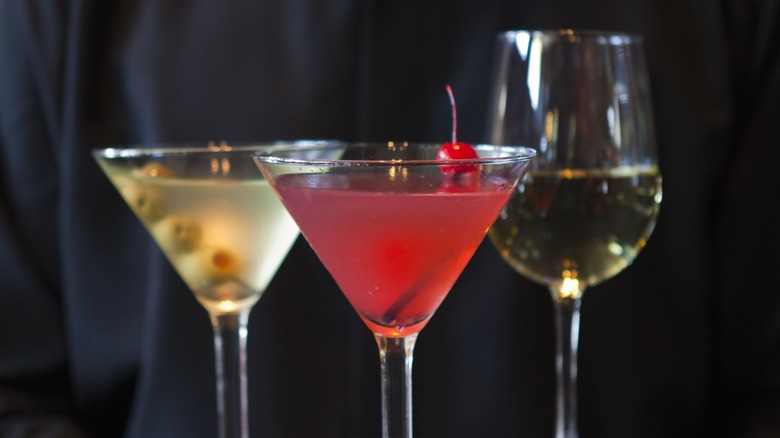The Origin Of The Word 'Cocktail' Has Nothing To Do With Drinks
The average adult speaks and hears tens of thousands of words every single day — a figure that likely increases rapidly when you're sitting in a bar. And before those drinks you're sipping while doing so were called "cocktails," alcoholic mixed drinks were often referred to as "slings." But proto-cocktail fans were inspired enough (or had enjoyed enough beverages) to take a little colorful inspiration from the animal kingdom (yes, really).
According to the Online Etymology Dictionary, by 1798, the word "cocktail" was a noun used to refer to "a drink made from water, sugar, spirits, and bitters." Incidentally, this definition bears a remarkable similarity to the recipe for an Old Fashioned. Before 1796, the word "cocktail" might have evolved from a word meaning "a horse with a docked tail" or "a horse of mixed pedigree." In case you're unfamiliar, docked horse tails stand straight up and fan out like a rooster's, and these horses historically belonged to poor rural farmers who couldn't afford thoroughbreds.
It's kind of a stretch, but this elaborate analogy was thought to have alluded to the way cocktails are assembled (mixed horse, mixed drink). Some historians speculate that the perky horse tail metaphor also invoked the idea of enlivening one's spirit, a goal that cocktails are famous (or perhaps infamous) for achieving in spades. "Cocktail" meaning "mixed drink" also could have begun colloquially in New Orleans' French Quarter, as an egg cup ("coquetier" in French) was the receptacle in which the legendary inventor of Peychaud's bitters mixed his eponymous ingredient.
An animalistic appetite for aperitifs
The first formal definition of the cocktail appeared in print on May 13, 1806, in The Balance and Columbian Repository of Hudson, New York (via Difford's Guide), which wrote, "Cocktail, then, is a stimulating liquor, composed of spirits of any kind, sugar, water, and bitters." The entry goes on to tease, "It renders the heart flout and bold, at the same time that it fuddles the head. It is said also to be of great use to a democratic candidate: Because, a person having swallowed a glass of it, is ready to swallow anything else."
Still, sippers might have been using the term "cocktail" to refer to drinks colloquially long before it appeared in print. In an April 28, 1803, issue of the Farmer's Cabinet – an agricultural newspaper based in Amherst, New Hampshire — one editorial jokes about a classic "hair of the dog" situation in which a hungover "lounger" wakes up feeling lousy with "no appetite," then "drank a glass of cocktail," which proved to be "excellent for the head."
The name "cocktail" might also have been inspired by colorful rooster tail feathers, which were a commonplace garnish during Colonial times. In the 1821 novel "The Spy" by James Fenimore Cooper, American Revolution-era innkeeper Betty Flanagan serves visiting French soldiers alcoholic drinks garnished with tail feathers plucked from a rooster. Shortly thereafter, in his 1844 novel "The Life and Adventures of Martin Chuzzlewit," Charles Dickens wrote that his character had a famous capacity for drinking "rum-toddy, mint-julep, gin-sling, and cocktail."

